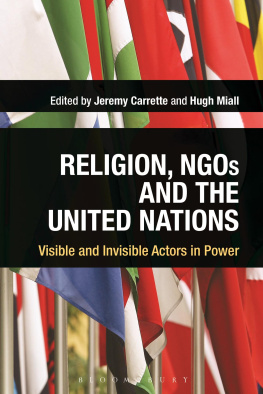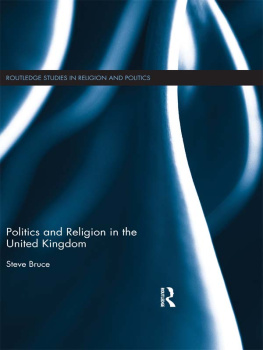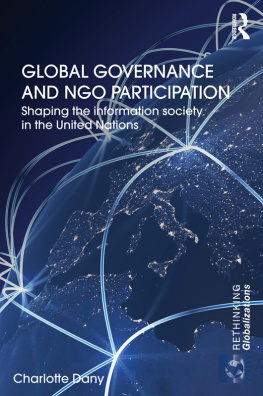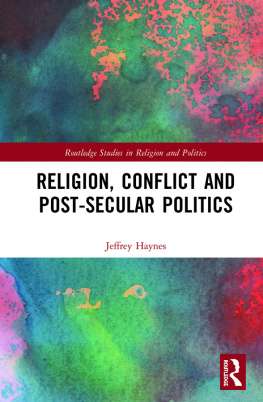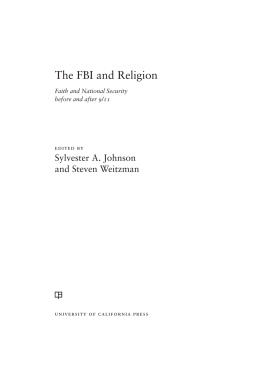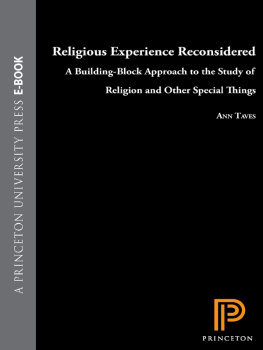Religion, NGOs and the United Nations
Also available from Bloomsbury
Education and NGOs, edited by Lorraine Pe Symaco
Mission and Development, edited by Matthew Clarke
Religion and Politics in International Relations, Timothy Fitzgerald

Contents
Detailed Contents
Verena Beittinger-Lee
Independent Scholar and Policy Analyst, Heidelberg, Germany
Verena Beittinger-Lee researches and teaches on modern Indonesian politics, human rights theory, democratization, civil society, international organizations, and the United Nations. She has held a number of positions in these areas, working for the German Institute of Global and Area Studies (GIGA) in Hamburg on a project on the Human Rights policies of Japan, Indonesia and the Philippines and as Research Fellow and Lecturer for Indonesian Studies at the faculty of Asian and African Studies at Humboldt University, Berlin where she acquired her PhD. She was Post-doc Field Researcher in New York for the AHRC/ESRC Religion & Society Project Religious NGOs and the United Nations in New York and Geneva from 2009 to 2011 and Visiting Research Fellow at the University of Kent from 2012 to 2014. She is the author of (Un)Civil Society and Political Change in Indonesia: A Contested Arena (Routledge, 2009).
Evelyn Bush, Associate Professor, Department of Sociology and Anthropology
Fordham University, USA
Evelyn Bush is an Associate Professor in the Department of Sociology and Anthropology at Fordham University, USA. She received her PhD in Sociology from Cornell University in 2005. Her research has focused largely on organized religious participation and influence in international and foreign policy institutions that focus on human rights. She was specialist consultant for the survey analysis and co-investigator for the AHRC/ESRC Religion & Society Project Religious NGOs and the United Nations in New York and Geneva from 2009 to 2013. Her publications have included Measuring Religion in Global Civil Society (Social Forces), Explaining Religious Market Failure, (Sociological Theory), and several chapters in edited volumes in the field of international relations.
Jeremy Carrette, Professor of Philosophy, Religion and Culture
University of Kent, UK
Jeremy Carrette is Professor of Philosophy, Religion and Culture at the University of Kent, UK. He was the Principal Investigator of the AHRC/ESRC Religion & Society Project Religious NGOs and the United Nations in New York and Geneva between 2009 and 2013. He works in the interdisciplinary study of religion across the fields of philosophy, psychology, politics and the history of ideas. He has written on a wide array of themes in the study of religion and previously published contributions on Quaker NGOs and globalization. His published works include studies on Michel Foucault, William James, the politics of spirituality and the philosophy of religion. His most recent monograph publications are Religion and Critical Psychology: Religious Experience in the Knowledge Economy (Routledge, 2007) and William Jamess Hidden Religious Imagination: A Universe of Relations (Routledge 2013).
Hugh Miall, Emeritus Professor of International Relations, and Chair of the Conflict Research Society
University of Kent, UK
Hugh Miall is Emeritus Professor of International Relations at the University of Kent and Chair of the Conflict Research Society. He was previously Director of the Conflict Analysis Research Centre at the University of Kent, Director of the Richardson Institute for Peace and Conflict Research at Lancaster University and a Research Fellow in the European Programme at Chatham House. He was co-investigator for the AHRC/ESRC Religion & Society Project Religious NGOs and the United Nations in New York and Geneva from 2009 to 2013. His recent publications include Contemporary Conflict Resolution (4th edition, Polity, 2016), A Reader in Contemporary Conflict Resolution (Polity, 2015), and Emergent Conflict and Peaceful Change (Palgrave, 2007).
Sophie-Hlne Trigeaud, director of studies and adjunct lecturer
Catholic Institute of Paris
Sophie-Hlne Trigeaud is director of studies and adjunct lecturer at the Catholic Institute of Paris. She teaches anthropology, sociology and religious studies and has a doctoral degree from the Ecole de Hautes Etudes en Sciences Sociales in Paris. She is author of Devenir mormon: La fabrication communautaire de lindividu (Presses Universitaires de Rennes, 2013); the published version of her PhD thesis on the Mormons. She participated in a research project on pilgrimage for the Association for the Sociology of Religion. She was the field researcher in Geneva for the AHRC/ESRC Religion & Society Project Religious NGOs and the United Nations in New York and Geneva from 2009 to 2011 and honorary researcher at the University of Kent from 20122014.
This work was part of the Religion & Society Programme in the UK, directed by Professor Linda Woodhead and funded by the Arts and Humanities Research Council (AHRC) and the Economic and Social Research Council (ESRC), with the aim to develop collaboration across the Humanities and Social Sciences in the study of religion and society (see www.religionandsociety.org.uk). The work in this volume reflects the final academic findings of the Religious NGOs and the United Nations project (2009 to 2013) and subsequent follow up discussions, articles and academic conference papers between 2013 and 2015. The main public findings were published at the end of the project in a dissemination booklet Religious NGOs and the United Nations in Geneva and New York (Canterbury: University of Kent, 2013), which received international attention for its finding that the United Nations showed an under-representation of non-Christian NGOs, especially Hindu and Buddhist NGOs. The subsequent media coverage of this finding and its implications for United Nations reform gained attention across a diversity of third sectors groups and media outlets. This present volume represents the more detailed academic discussions and fieldwork findings from the multidisciplinary project team (see contributors list), with its focus on processes and visibility/invisibility.
We wish to thank the AHRC/ESRC for its financial support for the project and Professor Linda Woodhead for continued guidance and support. Along the way administrative support from Peta Ainsworth and Rebecca Catto was very helpful. We thank the Department of Religious Studies and the School of Politics and International Relations, University of Kent, UK, for their support during the fieldwork. Thanks also to Lalle Pursglove and Bloomsbury for supporting us in the publication of the work.
A number of people helped with the project and offered support in various ways over the years. We particularly thank Professor Jeff Haynes for his academic consultation during the research and Rachel Brett (QUNO, Geneva) and Julia Berger (Bahai International Community, New York) for fieldwork support and QUNO, Geneva, and the Bahai International Community, New York, for allowing us to host various discussions and dissemination events at their UN offices. We thank Rachel Brett, Julia Berger and Richard King for consultative support for the initial project workshop on the category of religion and the UN and the Bristol Online Survey team for support with the questionnaire. We also thank all the members of the team for their efforts to keep working across differences in approaches, methods and continents.

